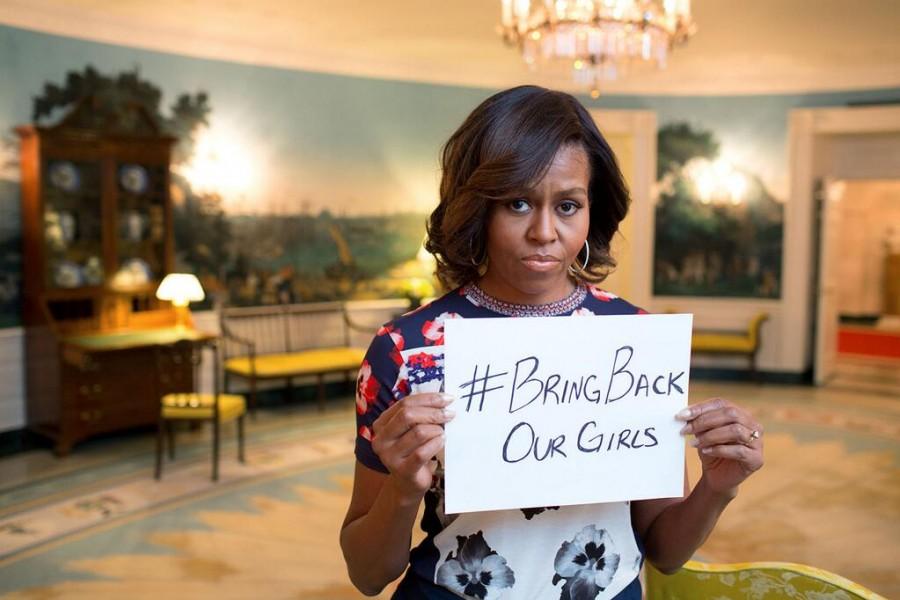When 276 girls in Nigeria were abducted from their school and international news remained silent, protesters employed an innovative weapon: the power of social media.
The girls were kidnapped on April 14 from their school in Chibok, Nigeria. The militant Islamist group Boko Haram later claimed to be responsible for the attack in a video message, with one leader threatening to sell the girls into forced marriages.
“If it had happened anywhere else, this would be the world’s biggest story,” CNN’s Frida Ghitis pointed out afterward.
However, the event initially failed to make it onto major news networks. Other stories such as the South Korean ferry sinking, missing flight MH370, and the racism fiasco surrounding the National Basketball Association took precedence. Families and supporters of the girls also felt that the Nigerian government was not working hard enough to find them.
For whatever reasons, the story of nearly 300 Nigerian girls being kidnapped was not being told. So protesters decided to make it front-page news.
They turned to social media, using the hashtag #BringBackOurGirls to rally attention.
“I realized recently that a hashtag is like a call,” said Ramaa Mosley, a Los Angeles director heavily involved in the campaign. “It’s like a call out to the world and it’s also an amalgamation so you can pull together information, put that information in and get information back.”
The campaign took off, achieving over one million tweets on Twitter by May 7 and becoming one of Facebook’s top trending topics, according to mashable.com.
A Facebook page compiling information about the story and offering suggestions to viewers about ways to take action has gathered more than 43,000 likes.
Carlmont student Max Conrad said of the success, “I think this is different [from other campaigns] because there is a clear and present danger to [the girls’] lives.”
Celebrities and world leaders added their voices to the calls for action, including Kerry Washington, Chris Brown, Anne Hathaway, and Malala Yousafzai, the Pakistani school girl who survived being shot in the head by the Taliban.
Hillary Clinton tweeted on May 4, “Access to education is a basic right & an unconscionable reason to target innocent girls. We must stand up to terrorism. #BringBackOurGirls.”
Michelle Obama, the First Lady of the United States, posted a picture to Facebook and Twitter of herself on May 7 holding a white sign bearing the message #BringBackOurGirls.
Supporters have also held rallies in places such as New York City’s Union Square and London, according to mashable.com.
Still, some students are concerned over the campaign’s ability to turn awareness into action.
The campaign’s reach can be limited for people not on social media sites. Carlmont student Nik Grimsby said that he does not have a Twitter or Tumblr account, and has not seen the hashtag on Facebook.
“I haven’t seen anything about the campaign, but I have heard about the incident,” said Grimsby. “But I’m not surprised that there is [a campaign]. If I did see it, I would support it.”
However, when asked if the campaign was effective, Grimsby said, “In a way no, because these criminals are not going to care about what Americans think.”
“Think about it from their point of view,” said Grimsby. “They obviously don’t care about human life, so why would they care about what social media is doing?”
Conrad also expressed doubt, “Mostly because the people [they reach] are probably going to be middle class westerners. It’s like Kony 2012. I mean, what are a bunch of middle class westerners going to do to save children in Africa?”
Nonetheless, the social media campaign of #BringBackOurGirls has lead to some concrete results.
Labaran Maku, Nigeria’s Minister of Information, stated in a press release that “the President assures Nigerians that ‘wherever the girls are in the world, we will get them back, apprehend and punish the culprits.’”
John Kerry, the United States Secretary of State, pledged U.S. support for Nigeria’s efforts to find the missing girls. According to BBC News, experts from the United States and the United Kingdom have arrived in Nigeria to help, including military advisers and negotiators.
Grimsby summed up the feelings around the social media campaign, saying, “It was a horrible incident that was wrong, and we want them back.”

